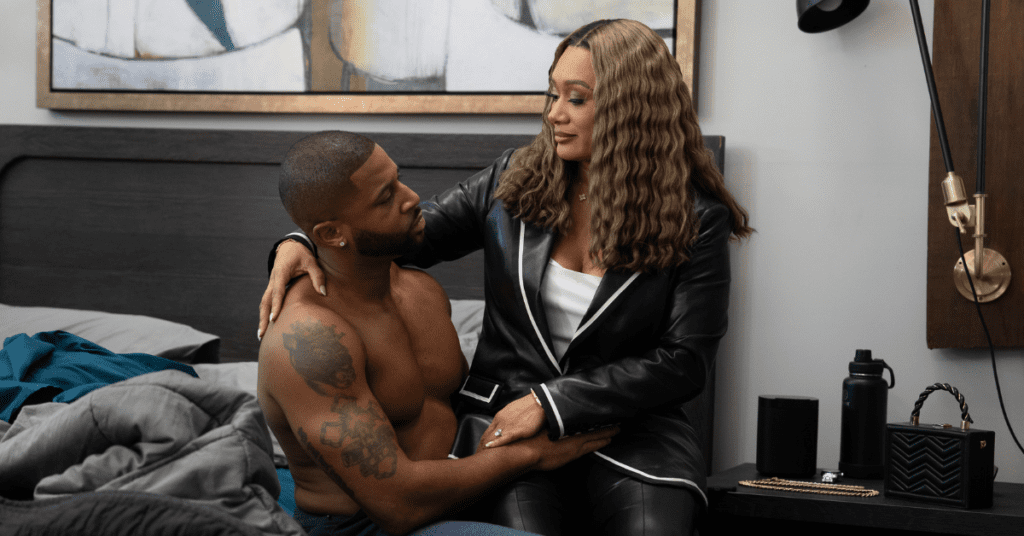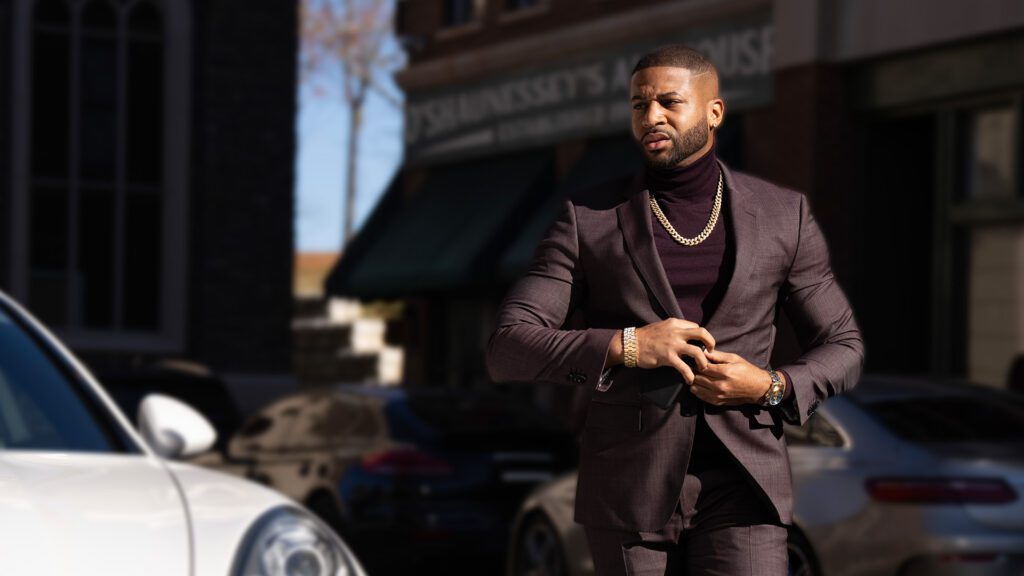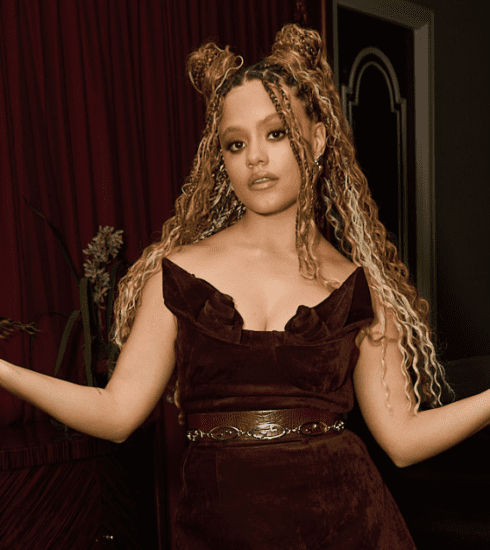From Zac to Real Life: Devale Ellis on Oversexualization, Boundaries, and Black Masculinity
In an intimate conversation delving into masculinity, vulnerability, and the emotional challenges Black men often face, actor Devale Ellis reflects on his transformative journey. Best known for his portrayal of Zack on Tyler Perry’s hit series Zatima, Ellis doesn’t just play a role—he brings to life the struggles, resilience, and humanity of Black men who often grapple with being understood in a society that rarely grants them space to be vulnerable.
The Oversexualization of Black Men
When asked if he relates to Zac’s experience with oversexualization, Ellis didn’t hesitate to draw parallels between his character’s journey and his own life. He shared a personal anecdote about the double standards Black men face regarding sexualization and consent. “The over-sexualization of Black men gets discarded, as if we all just want that all the time, and that’s not the case,” he reflected.

Ellis then recounted a night out that vividly illustrated this dynamic. He described how an encounter with a woman turned uncomfortable when she crossed a line. “She grabbed me inappropriately,” Ellis began, his tone shifting as he revisited the moment. “My first instinct was to grab her wrist and say, ‘I don’t know who you think I am, but I’m not who you are.’” Instead of acknowledging her actions or apologizing, the woman laughed, dismissing his discomfort with a flippant, ‘I think you’re attractive.’
This incident didn’t end there. As bouncers approached, Ellis found himself on the defensive despite being the one violated. “I asked them, ‘Do you realize she grabbed me first?’” he recounted. The assumption that he was the aggressor, despite clear evidence to the contrary, revealed the deeply entrenched biases society holds.
“The problem is people don’t think Black men can be victims of this,” Ellis explained, frustration lacing his voice. “They think we’re always up for it, always consenting. But that’s not who I am, and it’s not who most of us are.”
This story highlights the lack of empathy and the double standards Black men face when it comes to personal boundaries, showcasing the imbalance in how victims are perceived. For Ellis, this underscores the need for mutual respect in conversations surrounding masculinity and consent. His experience sheds light on the complexities of navigating societal perceptions while advocating for a more nuanced and equitable dialogue on these issues.
The Complexity of Black Masculinity
Ellis challenges rigid societal definitions of Black masculinity, emphasizing that success, identity, and emotional expression are diverse and multifaceted. “Black masculinity doesn’t look one way. Black success doesn’t look one way. Black excellence doesn’t look one way,” he stated passionately. He advocates for rejecting stereotypes that overshadow individuality, calling for Black men to embrace the best version of themselves, regardless of external expectations.

This message resonates deeply as Ellis pushes back against monolithic portrayals of Black men. By portraying Zac, a character whose journey involves love, trauma, and redemption, Ellis redefines what it means to show strength through vulnerability, urging men to embrace their complexity.
Family, Affection, and Emotional Connection
The conversation shifted to the role of family in shaping emotional identity, particularly the impact of Ellis’s upbringing on his adult relationships. “I grew up with both parents, with a very involved father and a loving mom. But despite the love in our home, I didn’t get the affection I craved from my mother,” he shared.
This absence of affection, Ellis explained, shaped his desire for emotional connection as an adult. “I craved affection from the woman I wanted to spend my life with because I didn’t get that type of affection from my mom.” He pointed out that this need for connection is often misunderstood in Black men, reinforcing damaging stereotypes around their intentions and sexuality.

Ellis’s on-screen role as Zac reflects this reality. “I realized that a lot of times, that affection comes in the form of sex. Black men, just like anyone else, seek genuine emotional connection and understanding, but often find themselves mischaracterized.” This vulnerability adds depth to Zac’s character and resonates with Ellis’s personal experiences, revealing the emotional complexity beneath the surface.
The Power of Vulnerability and Support
One of the most powerful moments Ellis highlighted was a scene from Zatima where Zac is emotionally vulnerable. In Season 2, Episode 2, Zac sees his mother with another man, ignoring his attempts to reach out. The scene hit close to home for Ellis, who recalled feeling similarly neglected by both his mother and a girlfriend in his 20s. “It felt so real that I broke down in the middle of the scene,” he admitted.
This emotional depth resonated with viewers. “So many men reached out saying they felt the same way—seeing a man just sitting in the car with a woman, not going weak but being vulnerable while she held him,” Ellis reflected. This moment of raw vulnerability and support became a testament to the importance of showing emotional depth in men and the power of true emotional support in relationships.
Redemption, Growth, and Breaking Stereotypes

Redemption is a central theme in both Zac’s story and Ellis’s personal journey. “When you look at things like vulnerability, trauma, sexualization, and redemption, people tend to put them in a box,” Ellis explained. He highlighted how society often refuses to let people grow beyond their mistakes, wanting to see them only through a singular lens.
“Zac tries his best, but people still want to see him a certain way,” Ellis said, underscoring the need for grace and understanding. He advocates for giving people—and ourselves—the space to evolve and grow. “Let’s stop labeling people the minute we meet them. Give each other the grace to learn and get better.”
This call for empathy and patience challenges audiences to see redemption as a continuous process rather than a fixed destination, both on and off-screen.
A New Definition of Success and Masculinity
Ellis concludes with a powerful message about the future of Black masculinity and success. “Black masculinity doesn’t look one way. Black success doesn’t look one way. You have a responsibility to be the best version of yourself, no matter what anyone else says about it.”

For Ellis, true impact comes from fostering empathy, inclusion, and respect for diverse identities. His vision is one where individuals are accepted for their authentic selves, free from societal constraints. Ultimately, Ellis hopes that his legacy—both on-screen and off—will inspire others to embrace their uniqueness while uplifting those around them.






